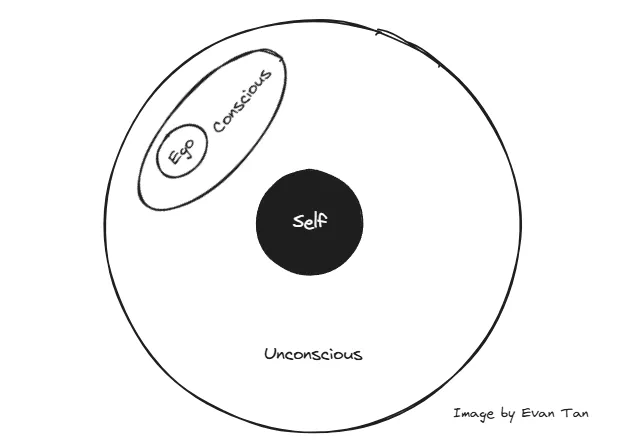Individuation and the Will to Meaning
Meaning is of primary and not secondary importance, and the journey of individuation.
By Evan Tan I was recently listening to an interview with Dr James Hollis, who talked about finding purpose and managing transitions in life. He talked about the concepts and work of Carl Jung, which struck a chord with me. I’ve since read Jung’s book Man and His Symbols, and am noting down some of the key concepts here, which resonate with me at this stage of life that I am at now. I drew out this diagram based on the ideas and images I encountered in the book Man and His Symbols, to capture my understanding of the relationship between the ego-consciousness and the unconscious in an individual’s psyche: To me, the process of individuation is a journey towards meaning. A concept I derived from reading Viktor Frankl’s book “Man’s Search For Meaning” is the primacy of the will to meaning. Many of us are familiar with the notion of Maslow’s hierarchy of needs, which places actualisation at the top of the pyramid, which could be taken to imply that meaning and purpose are a luxury compared to our basic needs. However, Frankl put forward a powerful insight in his book, in which he observed that in the concentration camps, the individuals who were likeliest to survive were those that had meaning to live for, while a pattern of behaviour was observed in those whose “meaning orientation had subsided”, where they eventually gave up and succumbed in a matter of hours under the extreme conditions. This left a deep impression upon me, that effectively; Meaning is of primary importance, and not secondary. I’ve pulled out a list of questions provided by Dr James Hollis in his book “Finding Meaning in the Second Half of Life”, to help guide this journey of individuation. I’ve found these useful for journalling purposes, to help prompt my writing entries and contemplation. I find this poem by Mary Oliver captures this notion of the journey of individuation beautifully: One day you finally knew
Published
11 Nov 2024

Representation of the psyche with the ego-consciousness and unconscious.
The Journey by Mary Oliver
what you had to do, and began,
though the voices around you
kept shouting
their bad advice—
though the whole house
began to tremble
and you felt the old tug
at your ankles.
“Mend my life!”
each voice cried.
But you didn’t stop.
You knew what you had to do,
though the wind pried
with its stiff fingers
at the very foundations,
though their melancholy
was terrible.
It was already late
enough, and a wild night,
and the road full of fallen
branches and stones.
But little by little,
as you left their voices behind,
the stars began to burn
through the sheets of clouds,
and there was a new voice
which you slowly
recognized as your own,
that kept you company
as you strode deeper and deeper
into the world,
determined to do
the only thing you could do—
determined to save
the only life you could save.
Recent Articles
- Individuation and the Will to Meaning 11 Nov 2024
- Contemplating the Infinite under Finite conditions 2 Jun 2023
- How I Overcame GMAT Critical Reasoning Questions - Reasoning from first premises 29 Oct 2022
- Hello world, from Centroly 25 Jul 2021
- How To Setup A Middleman Blog For Free With GitHub Pages 28 Jun 2020
- Build A Company People Want To Stay With, For Their Entire Careers 24 May 2019
- For SaaS Startup Success, Plan For 10 Years And More 17 Apr 2019
- Present(ing) Futures 1 - The future Singapore economy 4 Apr 2016